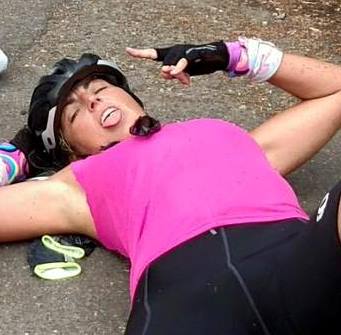 Recently, I was lying in bed and it was raining outside. I was scheduled for a workout but I was having a hard time leaving my warm bed to head outside into the cold, wet day. As I lay there having a difficult time finding the motivation, I was asking myself if I was being lazy or if maybe, my body needed a day off. I like to start my day by revving my metabolism but I’m just like everyone else and some days I just don’t feel like it. I thought I’d share the tips I use to determine whether I’m being lazy or I need a day off.
Recently, I was lying in bed and it was raining outside. I was scheduled for a workout but I was having a hard time leaving my warm bed to head outside into the cold, wet day. As I lay there having a difficult time finding the motivation, I was asking myself if I was being lazy or if maybe, my body needed a day off. I like to start my day by revving my metabolism but I’m just like everyone else and some days I just don’t feel like it. I thought I’d share the tips I use to determine whether I’m being lazy or I need a day off.
- If I’m tempted to press the snooze button and I fall right back asleep, that’s a sign my body needs some extra rest. If I just lay there wide awake, I’m probably just being lazy so I get up.
- When I first wake up, I will check my emails and/or Facebook and the light from my cell usually wakes me up and then I’m ready to go. If that doesn’t work, I may need some more rest.
- If I’m really tired, I will force myself to get up and open the blinds, grab some water and walk around. Usually by moving around, I start to wake up and feel better. If I’m still feeling exhausted, the rest is probably more important.
I’ve had days where both my kids were sick and my body felt like it was fighting something so I decided to take a rest day and reserve the energy for my immune system to give it a good fighting chance. A workout will stimulate your immune system but if it’s already being challenged, it can suppress it and take it over the edge.
Should you take a weekly rest day?
Many experts agree that one rest day per week is a healthy approach to a fitness regime and assures that your body is allowed enough time to repair and recover. That doesn’t mean you have to lay around on the couch all day eating bon bons! You can still be active like go for an easy hike, walk or bike ride, but don’t worry about pushing the pace or getting into your training zone. Just enjoy being active!
Don’t forget to sign up to automatically receive updates to your inbox when I post a new blog!
Right up here!
Should you exercise when you’re sick?
We’re entering Fall and Winter is right around the corner and hand in hand, comes cold and flu season. We’re all indoors more and therefore exposed to more germs increasing the chances that we may get sick. So the question is – can you keep exercising when you’re sick? Although more research is needed in this area, the general guideline is that if you have symptoms of a common cold with no fever and all your symptoms are above the neck, moderate exercise like walking or a light jog should be ok. However, if your symptoms include fever, extreme tiredness, muscle aches or swollen lymph glands, you should refrain from exercise until you get better. When you do start exercising again, progress slowly and gently. And keep in mind, even if you do have to take a few days off because you’re feeling under the weather, it really won’t make that big of a difference to your overall fitness level if you’re consistent with your program the rest of the time.
If you find yourself getting sick often, is there something you can do about it?
We are exposed to germs and viruses all the time so what determines whether you actually get sick or not?
The likelihood of you catching the cold or flu depends on a number of factors, including advancing age, whether you smoke or not, high levels of stress, poor nutrition and lack of sleep. So if you are getting sick regularly, you should determine if whether you need to adjust your sleep or nutrition habits or determine methods to minimize your stress levels.
It is important to note that exercisers frequently report that they experience less sickness than their sedentary peers. In fact, according to the American Council on Exercise, 61% of 700 recreational runners had fewer colds since they began running while only 4% reported the frequency had increased. During moderate exercise, various immune cells circulate through the body more quickly and are better able to kill bacteria and viruses. So every time you go for a brisk walk, your immune system receives a boost that could increase your chances of fighting off respiratory infections.
But exercise won’t guarantee you won’t get sick. Sometimes, too much exercise can put you at a greater risk for developing a virus. For example, a high percentage of marathoners and triathletes get sick immediately after a big event. The theory is that exercise in generals boosts the immune system but too much exercise at a high intensity may suppress it making you more susceptible to catching viruses. So if you have just completed a very strenuous event or race, be sure to ramp up your sleep and eat very nutritiously to assure your body is in the best position to fight off any viruses.
Here are some general tips to strengthen your immune system and reduce your odds of getting sick:
Eat Well
The immune system depends on many vitamins, minerals and sufficient caloric intake for optimal functioning. Make sure you consume plenty of fruits and vegetables and drink a minimum of eight glasses of water per day.
Get Lots of Sleep
The American Council on Exercise reports that major sleep disruption (three hours less than normal) has been linked to immune suppression.
Exercise
Move your body and workout so you receive a regular boost to your immune system.
Avoid Overtraining
Space vigorous workouts and race events as far apart as possible. Allow for adequate recovery days within your schedule.
Yours in health & fitness,
Sherri McMillan

